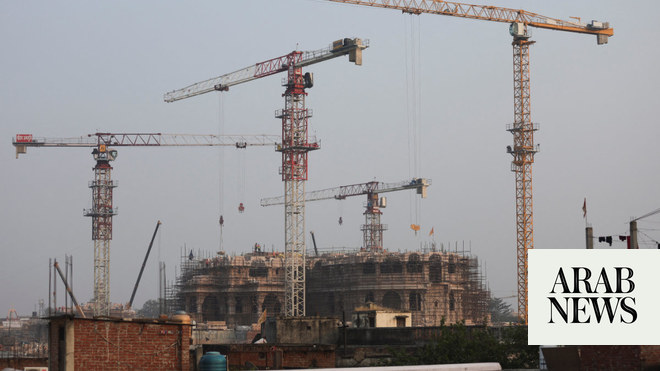
Uttar Pradesh’s district administration says no families “forced to leave” the vicinity as part of security initiative
Muslim families say district administration “forced them to sign a consent form to shift from their ancestral place”
NEW DELHI: The district administration of Gorakhpur in India’s most populous state of Uttar Pradesh has denied forcibly evicting Muslim families from their ancestral homes as part of an initiative to ramp up “security measures” near a century-old temple.
“We are not forcing anyone (to leave),” K. Vijyendra, Gorakhpur’s district magistrate (DM), told Arab News on Sunday.
“There is no pressure. The agreement letter means that they can walk away from the land. It’s my land, and no one can take my land without my consent,” he explained about the notification issued to 11 Muslim families at the end of May.
The DM explained that the land was being acquired “out of security concerns.”
The move by the state government in Utter Pradesh — which shares its border with national capital New Delhi and is home to more people than Brazil — is being spearheaded by Chief Minister Yogi Adityanath, a controversial leader of the ruling Bhartiya Janata Party (BJP), known for his polarizing politics.
Adityanath is the chief priest of the Gorakhnath temple in the district, an expansive religious site spread across more than 50 acres and considered sacred by most Hindus living in the state.
According to district officials, more than 80 Muslims were issued a letter on May 27, seeking their consent to vacate their homes for the security initiative.
However, the families allege that the district administration “forced them to sign a consent form to shift from their ancestral place” where they have been living for more than a century.
“We were not made aware of the complete picture before the signatures were taken,” Mushir Ahmad, 70, who signed the consent letter, told Arab News.
“The officials only talked about security (measures in the area), and we had the impression that they want to set up some system on our terrace and signed the paper,” he explained. “Now we realize what the form was. It scares us to think about leaving this place which has been our home for over 130 years.”
Officials, however, denied the claims, adding that the Muslim residents were “free to walk away.”
“In the beginning, everyone agreed. We showed them the level of compensation, asked them what they want, we offered them lots of things, and they agreed and signed the paper saying that they don’t have any problem,” Vijyendra told Arab News.
“After a regular assessment . . . it was found that the temple security is not up to the mark and extra land is needed to beef up security, and for that the temple is giving some land and acquiring other lands,” he said.
A majority of the district’s Muslim residents are handloom workers who became redundant after a decline in demand for products that require a particular skillset passed down the generations.
Today, they rely on earnings from small, standalone stores in the neighborhood to survive. With limited sources available to make a living, a rent-free ancestral home is a boon for many.
“It’s not easy to think of vacating your ancestral house. We will not leave it so easily,” Ahmed, a father of four, who lives with his extended families in a two-story house near the Gorakhpur temple, told Arab News.
His neighbor, 52-year-old Jamshed Alam, shared a similar grievance.
He talked about a time when their children played with Hindu neighbors in the area, frequented each other’s shops and celebrated festivals together.
“We have been part of the temple’s ecosystem and never thought that we were a security issue for the temple,” Alam, a handloom worker, told Arab News.
“We would not like to vacate our ancestral area. We are under a lot of pressure and tension,” he said.
Alam’s relative, Intezaar Hussain, agreed: “The consent was taken by keeping the poor and illiterate people in the dark.”
“They did not realize what they were signing on, the gravity of the situation struck them later on, now they are tense and don’t know what to do now,” Hussain told Arab News.
Muslims have reportedly been on the receiving end of a conflict caused by the deepening divide in Uttar Pradesh since the BJP came to power in 2014.
Containing nearly 20 percent of the state’s population of 220 million Muslims, the region has been a hub of religious tensions, exacerbated by Adityanath, a hard-line priest and senior BJP official.
Last month, the local administration in the Barabanki district of the state demolished a century-old mosque claiming that it never existed.
Political analysts say that these divide-and-rule tactics are part of a “wider game plan” ahead of the state elections next year, with the BJP facing a tough challenge over its handling of the COVID-19 pandemic.
“The BJP has failed badly on the developmental issue and now wants to fight the elections on the issue of religious communalization and polarization,” Asad Rizvi, a political analyst based in Lucknow, capital of Uttar Pradesh, told Arab News.
When the second wave of the coronavirus hit India, most deaths were reported in Uttar Pradesh, with more than 21,000 people losing their lives since March.
The state’s fragile health care system went into overdrive to reduce the fatality count. However, a shortage of oxygen and hospital beds led to a spike in the death rate, with several reports of bodies being thrown into the river Ganges due to a lack of crematoriums.
“The state failed to take care of the people at the time of the (COVID-19) crisis. The government lost face. The issue of eviction in Gorakhpur is part of the polarization plan to divert the attention from the failure of governance,” Rizvi said.










